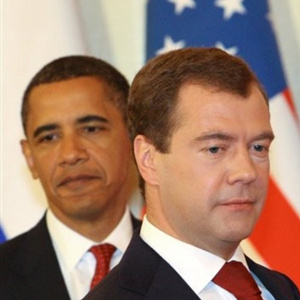The Cold War Legacy Lingers On
Elahey Koulayi, university professor and Russian affairs expert comments on Russia-US relations and the missile defense shield.

 During the recent years, the United States has been seeking to deploy its missile defense shield in Eastern European countries of Poland and Czech. However, Russia has opposed this project since its very beginning. In fact, despite the excessive optimism Russian showed towards the Americans in the first years of Soviet Union dissolution, suspicion between the two countries has been on the rise since the second half of 1990s. Hence, even if compliments were exchanged between leaders of the two countries and their focus was on common interests, deployment of missile defense shield near Russian borders has been an influential factor in creating and sustaining tension and mistrust between the United States and Russia.
During the recent years, the United States has been seeking to deploy its missile defense shield in Eastern European countries of Poland and Czech. However, Russia has opposed this project since its very beginning. In fact, despite the excessive optimism Russian showed towards the Americans in the first years of Soviet Union dissolution, suspicion between the two countries has been on the rise since the second half of 1990s. Hence, even if compliments were exchanged between leaders of the two countries and their focus was on common interests, deployment of missile defense shield near Russian borders has been an influential factor in creating and sustaining tension and mistrust between the United States and Russia.Americans claim that defense shield is intended to protect Europe and its allies against missile threats from Iran and even North Korea. Russia has never fallen for that however and the rift between this country and the United States is opening wide when there are other bones of contention like America’s approach to former Soviet Union such as Ukraine and Georgia and NATO’s expansion towards east. The missile defense shield has become the fundamental problem between former Cold War rivals and considering Russians’ particular concern over security issues, deployment of this system near Russia borders is definitely unacceptable for Russian leaders. Although both the United States and Russia try to shift from the Cold War outlook, outward signs show their leaders are still controlled by the influences of that era.
The missile defense shield has added importance in the current situation when U.S. and Russia are negotiating over nuclear weapons control and trying to revise their agreements on reducing strategic nuclear weapons, again a legacy of Cold War era. Strategic weapons reduction is now tied to Russia’s discontent with the American missile defense shield. We can not expect mitigation of reciprocal mistrust and paradigm shift merely with a formal meeting and normal compliments exchanged between leaders of the two countries.
In the Moscow meeting between Obama and Medvedev, although it was clear that both parties tried their best to distance from Cold War pessimistic perceptions, Obama sought to connect United States’ missile defense shield and Russia’s nuclear cooperation with Iran and once again remind that the defense shield is designed only to counter likely missile attacks from Iran and North Korea and it could not be used against Russia.
Russians do not buy these claims however and despite all the Americans’ arguments see the missile defense shield as a security threat. They believe that deployment of this system near Russian borders could weaken its nuclear power and undermine the country’ security. It is also worth mentioning that despite efforts in recent years –especially during Putin’s presidency- to establish balance between Russia’s security concerns and international realities, the prevailing ambiance among Russian leaders is one of suspicion against the United States defense shield policy.
Interestingly, the missile defense shield is going to be deployed in Poland and Czech, two countries which had to bear the presence of Red Army in their territory during the Cold War, and are quite concerned with Russia’s Eastern Europe policies. In fact, the hosting countries have compounded the mistrust. Meanwhile, Americans try to bring up Iran as a central topic of their talks with Russia and tie fate of missile defense shield with Iran-Russia relations.

